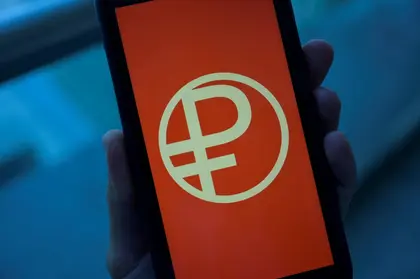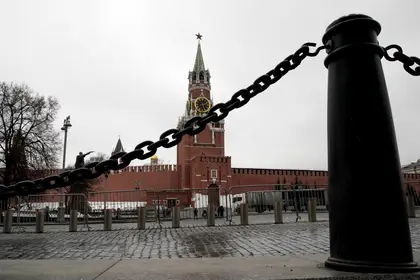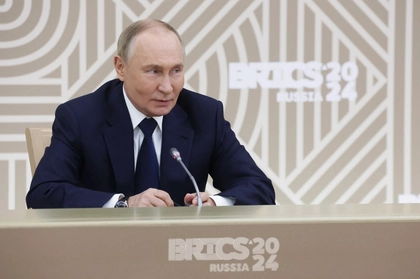Russia began testing its new digital ruble with consumers on Tuesday, in the hope blockchain technology will help it evade sanctions and tighten control over its citizens.
Why now?
JOIN US ON TELEGRAM
Follow our coverage of the war on the @Kyivpost_official.
Moscow has been mulling the idea of creating a digital currency for years, but the development of the digital ruble gathered pace after Western sanctions blocked Russia from parts of the global banking system.
The move has been given fresh impetus in recent weeks as the value of the regular ruble has plunged.
What’s the current state of the regular ruble?
Pretty bad. On Tuesday, Russia’s central bank hiked its key interest rate from 8.5 to 12 percent, after the ruble crashed to a more than 16-month low against the dollar the previous day.
The ruble has shed around 30 percent of its value against the dollar since the start of the year, as Moscow grapples with falling export revenues, rising imports and higher military spending.
Russia’s currency has suffered since the beginning of its full-scale invasion of Ukraine, in large part due to sanctions that limit Russia’s oil and gas revenues and to capital outflows.
Recent events like Ukraine’s drone strikes on Moscow’s financial district have added considerably to overall jitters.
As the ruble’s value falls, the value of the money in the pockets and bank accounts of Russians is decreasing and they can buy less and less with the same amount of money.

Up to 12,000 North Korean Troops Transferred to Russia, Satellite Images Show
Will the digital ruble help with this?
Moscow's aim is clear: to make its financial system more flexible and limit the impact of international restrictions which, if successful, would go some way to fixing its increasingly damaged economy.
“It will enhance Russia's ability to evade sanctions,” Mikkel Morch, founder of crypto-focused investment fund ARK36, told AFP.
He said the move will allow Russia to avoid banks where it faces restrictions, and that the blockchain is “much less easy to sanction and attack.”
Most Russian banks have been banned from the main system used for international transactions, pushing Moscow to look for other ways to de-dollarize.
The creation of the digital currency, Morch said, is “part of a geopolitical war between pro-dollar countries and anti-dollar countries,” in which the latter are trying to rid themselves of the US currency for trading.
Is there a catch?
Of course there is.
In October 2020, the Russian central bank said it wanted a digital ruble “to make payments secure, protected, fast, convenient, and accessible for any individual anywhere across Russia.”
Morch said, however, that digitizing the ruble would give authorities “immense control” over Russians and could be used as “the ultimate social control tool.”
He warned of it giving the government the power to issue fines or freeze assets with “the click of a button.”
In Russia, it is the FSB security service that oversees the safety of the digital ruble's financial architecture.
Some NGOs have already warned against possible abuse. “In the wrong hands, this data could be used to spy on citizens' private transactions,” researchers from the Atlantic Council stressed.
What does the Russian public think?
Ordinary Russians are not yet sold on the idea of actually using the digital ruble, with many cautious about its effectiveness and safety.
According to a survey by state-owned pollster VCIOM, around six out of 10 Russians have a “weak understanding” of the government's aims and are not ready to use the currency.
Economist Sofia Donets said ordinary Russians and companies are unlikely to feel much change in their daily lives during the testing phase. Despite fears the scheme could be abused, Donets said Moscow was trying “not to lag behind in the global (financial) context.”
To convince wary Russians, authorities have promised its use will be voluntary. They also argue it will make the lives of its citizens easier and more convenient.
One senior lawmaker, Anatoly Aksakov, said it would allow parents to have greater control over how their children spend their pocket money.
“For instance, you give money to a child who goes to school, saying it can only be spent on breakfast, buying books or textbooks,” Aksakov told a government paper.
“No matter how great the desire of the user to spend it on other purposes, it will be impossible to do.”
You can also highlight the text and press Ctrl + Enter






